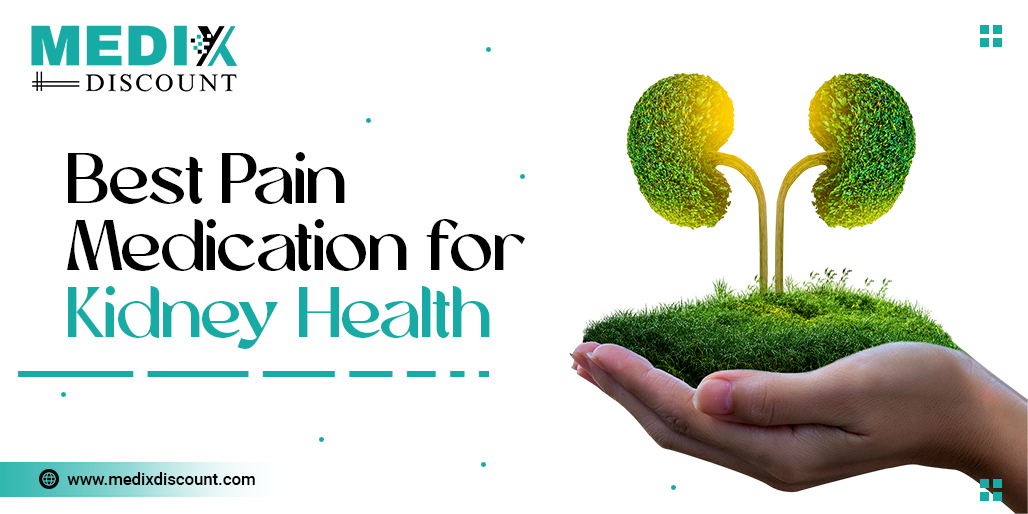Proper pain management is vital in healthcare, particularly for those with kidney problems. The best pain medication for kidney health may arise from different ailments, and although there are many medications, not all are kidney-friendly.
Selecting the appropriate pain relief is crucial to prevent additional kidney harm and promote overall health. This post will discuss the top pain medications for kidney health, emphasizing safety and efficacy.
Kidney Health and Pain Management
- The kidneys are vital organs responsible for filtering waste and excess fluids from the blood, maintaining electrolyte balance, and regulating blood pressure.
- When the kidneys are compromised, either due to chronic kidney disease (CKD), acute kidney injury (AKI), or other conditions, their ability to perform these functions diminishes.
- This makes it imperative to use the best pain medication for kidney health that does not exacerbate kidney damage.
- Pain management in individuals with kidney issues requires careful consideration of the medication’s pharmacokinetics and potential nephrotoxicity.
- Over-the-counter (OTC) pain relievers, such as nonsteroidal anti-inflammatory drugs (NSAIDs), can pose significant risks to kidney health, particularly when used long-term or in high doses. Therefore, it is crucial to explore safer alternatives.
Safe Pain Medications for Kidney Health
Acetaminophen (Tylenol)
Acetaminophen, also known as paracetamol, is widely considered the safest OTC pain medication for individuals with kidney issues.
Unlike NSAIDs, acetaminophen does not have anti-inflammatory properties, but it effectively relieves mild to moderate pain and reduces fever. It is metabolized primarily in the liver, with minimal impact on the kidneys.
Dosage and Safety: The recommended maximum daily dose of acetaminophen is 3,000 to 4,000 milligrams. It is essential to adhere to this limit to avoid liver toxicity, especially in individuals with compromised liver function.
Acetaminophen is suitable for treating headaches, minor aches, and pains related to kidney conditions, making it the best pain medication for kidney health.
Tramadol
Tramadol is a prescription medication that acts on the central nervous system to relieve moderate to severe pain. It is considered relatively safe for individuals with kidney issues when used under medical supervision.
Tramadol is metabolized in the liver and excreted by the kidneys, so dosage adjustments may be necessary for patients with impaired renal function.
Dosage and Safety: The typical starting dose of tramadol is 25 to 50 milligrams, taken every four to six hours as needed. For patients with reduced kidney function, the dosing interval may be extended.
It is crucial to follow the prescribing physician’s recommendations and monitor for any side effects, such as dizziness or gastrointestinal disturbances, to ensure it remains the best pain medication for kidney health.
Gabapentin
- Gabapentin is an anticonvulsant medication that is also effective in managing neuropathic pain, which is common in individuals with kidney disease.
- It works by altering the way the nervous system perceives pain signals.
- Gabapentin is excreted unchanged by the kidneys, making dose adjustments necessary for patients with renal impairment.
Dosage and Safety: Gabapentin is typically started at a low dose, such as 100 to 300 milligrams per day, and gradually increased based on response and tolerability.
Patients with kidney disease may require lower doses and extended dosing intervals. Common side effects include dizziness and fatigue, but these often diminish with continued use, positioning gabapentin as one of the best pain medications for kidney health.
Opioids
- Such as hydrocodone, oxycodone, and morphine, are potent pain relievers used for moderate to severe pain.
- While effective, opioids carry a risk of dependence and other side effects, such as constipation and respiratory depression.
- In individuals with kidney disease, certain opioids are preferred due to their metabolism and excretion profiles.
Dosage and Safety: Hydrocodone and oxycodone are partially metabolized by the liver, with a portion excreted by the kidneys. - Morphine, on the other hand, is primarily excreted by the kidneys and should be used with caution in patients with renal impairment. Dosage adjustments and careful monitoring are essential to minimize the risk of toxicity, making these opioids among the best pain medications for kidney health when used correctly.
Topical Pain Relievers
- Topical pain relievers, such as creams, gels, and patches, provide localized pain relief without significant systemic absorption.
- These medications, which include capsaicin, lidocaine, and diclofenac gel, are suitable for treating musculoskeletal pain and localized discomfort in individuals with kidney issues.
Dosage and Safety: Topical pain relievers should be applied as directed to the affected area. Since they have minimal systemic absorption, they are generally safe for individuals with kidney disease. However, it is essential to avoid using them on broken skin or mucous membranes to prevent irritation, making them a practical choice for the best pain medication for kidney health.
Pain Medications to Avoid with Kidney Issues
- Nonsteroidal Anti-Inflammatory Drugs (NSAIDs) NSAIDs, such as ibuprofen, naproxen, and aspirin, are commonly used for pain relief and inflammation. However, they can reduce blood flow to the kidneys and interfere with their function, particularly in individuals with pre-existing kidney conditions. Long-term use of NSAIDs can lead to acute kidney injury and chronic kidney damage and should be avoided when seeking the best pain medication for kidney health.
- Certain Opioids As mentioned earlier, opioids like morphine can accumulate in the body in patients with reduced kidney function, leading to an increased risk of toxicity. Codeine is another opioid that should be avoided in kidney patients due to its unpredictable metabolism and potential for adverse effects.
Non-Pharmacological Pain Management Strategies
In addition to medication, non-pharmacological approaches can play a significant role in managing pain for individuals with kidney issues.
These strategies can help reduce reliance on pain medications and improve overall quality of life, complementing the best pain medication for kidney health.
- Physical Therapy Physical therapy involves exercises and techniques to improve mobility, strength, and function. It can be beneficial for managing musculoskeletal pain and reducing discomfort related to kidney conditions.
- Cognitive Behavioral Therapy (CBT) CBT is a psychological approach that helps individuals develop coping strategies for managing pain. It focuses on changing negative thought patterns and behaviors that contribute to pain perception.
- Acupuncture Acupuncture involves the insertion of thin needles into specific points on the body to stimulate pain relief and promote healing. It is effective in managing chronic pain and maybe a suitable option for individuals with kidney issues.
- Relaxation Techniques Relaxation techniques, such as deep breathing, meditation, and yoga, can help reduce stress and alleviate pain. These practices promote overall well-being and can complement other pain management strategies, enhancing the benefits of the best pain medication for kidney health.
Conclusion
- Managing pain in individuals with kidney issues requires a thoughtful approach to ensure safety and efficacy.
- Acetaminophen, tramadol, gabapentin, certain opioids, and topical pain relievers are among the best pain medications for kidney health.
- It is crucial to avoid NSAIDs and certain opioids that can exacerbate kidney damage.
- Always consult with a healthcare provider to determine the most appropriate pain management plan tailored to your specific needs and kidney health.
- By making informed choices, individuals with kidney issues can effectively manage pain while safeguarding their kidney function, ensuring they use the best pain medication for kidney health.

